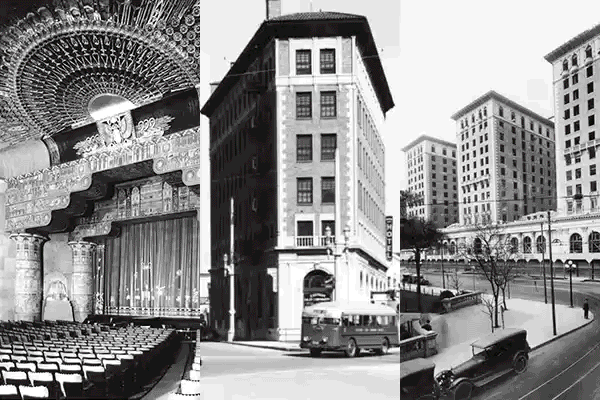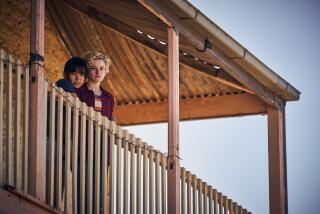TRAVELING in style : SPLENDOR FROM THE PAST : Incomparable Cliveden is the only British stately home owned by the National Trust that operates as a hotel
- Share via
It was one of those spiffy British limousines that dukes and duchesses and such ride in, and it scattered gravel like buckshot as it sped up the drive to Cliveden, Britain’s most celebrated stately home. Waiting to fetch the luggage were Michael Holiday, the butler, and a retinue of footmen. Although his role is that of general manager, butler is the title given to Holiday, who, attired in the livery of a royal servant, would do justice to the staff at Buckingham Palace. Indeed, as would his impeccably dressed footmen. Inside the mansion with its splendors of a past century, Holiday surrendered his new guests to Cliveden’s aristocratic managing director, the Hon. John Sinclair, who, with his American-born wife Marion waited in the Great Hall before an immense 16th-Century fireplace. Polished mahogany walls shone brilliantly as Sinclair led the group on a tour, identifying paintings of Cliveden’s former owners--including Lady Astor--and such celebrated guests as Queen Victoria, Edward VIII, Henry James, Henry Ford, Sarah Bernhardt, Lawrence of Arabia and H. G. Wells. These and myriad others.
Indeed, Cliveden’s 24 rooms and suites are named for famous guests who snoozed under its roof: Sir Winston Churchill, Lord Mountbatten, one of the Vanderbilts and the Countess of Shrewsbury, who is best remembered for having callously stood by while her paramour slew her husband in a duel. (The wench even held the reins of her lover’s horse while he administered the coup de grace .) At any rate, the names of guests, celebrated and nefarious, go on.
Dating from the 15th Century, Cliveden is not your ordinary stately mansion. Barely 30 miles outside London, Cliveden rises on a 375-acre estate near the village of Taplow, with the River Thames flowing by its door. Its gardens are magnificent. The service is without fault. Dignity is its hallmark. (As one visitor noted: “No chocolates on the pillow, no ribbons in the flowers, no sanitized bands around the loo.”) At Cliveden a staff of 85 footmen, maids and servants stands ready to pack and unpack one’s luggage, shine one’s shoes, draw one’s bath and otherwise pamper the dickens out of any wayfarer who ventures within its gates. For all this, a service charge is neither included nor expected.
Not another shelter in all of Britain compares to Cliveden, the only stately home owned by the National Trust that operates as a hotel. There is no reception desk, no gift shop, no bar. Should one wish a libation, one rings for a footman. Faster than an Olympiad, the footman returns with a belt of good Scotch. Or whatever. High tea is an afternoon ritual of dignified tradition and surplus calories (finger sandwiches, scones, ginger cake, fruitcake, eclairs). Guest rooms are opulent. No two are alike. Priceless tapestries are displayed along with suits of armor but without diminishing the warmth and hospitality of this splendid retreat hidden in the heart of the Thames Valley.
As the one-time home of a Prince of Wales and three dukes, Cliveden grew in stages, one of its architects being William Winde, who designed Buckingham Palace. Dating from 1666, it is a masterpiece of pomp that mesmerizes the most discriminating guest. William Waldorf Astor, the American-born statesman and publisher, bought Cliveden in 1893 and later passed it on to his son Waldorf as a wedding gift for the young man and his bride, Nancy, who was to become Britain’s first woman member of Parliament.
At Cliveden, Lady Astor entertained lavishly. The famous appeared ceremoniously in the spotlight with surprising frequency. And though she loathed Winston Churchill, the statesman made her guest list on numerous occasions. They argued constantly. During one encounter Lady Astor is said to have remarked to Churchill, “If you were my husband I’d put poison in your coffee,” to which Winnie responded, “If I were your husband, I’d drink it.”
Life indeed was lively at Cliveden.
Told that Cliveden was to become a hotel, former British Prime Minister Harold Macmillan remarked: “Dear boy, that’s what it always has been.” Macmillan, of course, was referring to those lengthy periods during which the home was crowded with celebrities and statesmen, generally at the invitation of Lady Astor. Franklin Delano Roosevelt slept beneath its shingles as did Anthony Eden, Rudyard Kipling, George Bernard Shaw, Charlie Chaplin. Kings. Queens. It was always party time.
Cliveden never fails to get raves. Its mahogany walls soar to lofty ceilings; its furnishings create a sense of relaxation. Panels gracing the French dining room were lifted from Mme. de Pompadour’s Chateau d’Asnieres, and an immense staircase leads upstairs to guest rooms. Cliveden is a collage of carved oak, marbled pilasters, friezes and fluted Corinthian columns. Statuary and temples appear in the gardens, and dead center of the driveway stands the inspiring Fountain of Love with its marble shell and life-size figures.
During Lady Astor’s era, Ascot Week was observed with great crowds at Cliveden. Indeed, no other English country house has provided shelter to a greater number of notables. Even with the war, Cliveden remained a place of escape from the pressures of that period until 1942, when Cliveden was given over to the National Trust, which in turn made a deal in the early ‘80s with Blakeney Hotels to operate Cliveden as an exclusive retreat for guests with an appreciation for art, opulence and the rare opportunity to hark back to an era of British grandeur.
Still, even with footmen in tails and the ghosts of departed aristocrats, Cliveden exudes the unusual warmth generally associated with less formal estates. A sense of total relaxation overcomes one the moment one enters the Great Hall. In the library guests sink into deep sofas, savoring quiet moments and the written word of famous authors. Dining room windows frame acres of grass with formal parterres and a morning mist that rises like the curtain on a scene that seems startlingly unreal. The River Thames is a backdrop, and guest rooms provide other vistas. The Countess of Shrewsbury’s suite is a masterpiece of gilt mirrors, antiques, a magnificent bed and a marble fireplace. Every guest quarter has a fireplace, as do some bathrooms.
At Cliveden guests enjoy a swimming pool, squash and tennis courts (both indoor and outdoor), a games room, billiard room, card room, gymnasium, Turkish bath and sauna. Picnic lunches are packed in Edwardian hampers containing such delights as salmon and a terrine of lobster with sauce verte. And there are cruises down the Thames on the Suzy-Ann, a restored 1911 pinnace. Other guests have a go at fishing, water skiing and taking in the horse races, followed by peaceful moments inside the venerable mansion. Of an evening they gather for cocktails in the Great Hall, the Library and the Card Room. The drinks are stiff; the conversation is subdued.
Cliveden is a scene of culture as well as relaxation. Music festivals are held intermittently. Peter Katin, the distinguished British pianist, joined an all-Schubert program last year. Only recently he returned to perform a Chopin recital. During Christmastime carolers and bell-ringers perform at the foot of the oak staircase whose banisters are festooned with garlands of box, yew, bay, ivy and holly. With a huge tree and logs blazing in the fireplace, the scene is pure magic.
Breakfast at Cliveden is a medley of fruit, juices, sausage, bacon and eggs, smoked salmon, kippers and kidneys, porridge, French toast, croissants and brioches. At dinner time the chef turns out such delectables as salmon tartare, sweetbreads with Madeira sauce, a salad featuring roast quail, roasted hazelnuts and girolle mushrooms. He does wonders with monkfish with mustard sauce, crayfish, a Scotch filet steak, lamb and outrageously rich desserts, after which it’s off to the library for coffee and another round of conversation.
To recall the joys of Cliveden, one may purchase robes designed especially for this stately home. There are enamel boxes by Crummels, soaps by Floris of Jermyn Street, decanters by Royal Brierley Crystal and linen sheets matching those between which one sleeps while a guest.
Rates at Cliveden vary, depending on one’s room or suite or particular arrangement made with management. A three-night stay in the Lady Astor Suite provides for the guest to be collected by chauffeured limousine and conveyed to Cliveden in time for afternoon tea, followed by Champagne cocktails and dinner. The second day is highlighted by breakfast in one’s room and a supper cruise down the Thames to Windsor, where a limousine awaits to deliver the guest back to Cliveden for smoked salmon and Champagne before retiring. Day three is given over to sightseeing in the countryside and a “gastronomic tour de force” back at Cliveden.
To be a guest at Cliveden is to be pampered, coddled and indulged beyond any hope of returning to the real world a satisfied soul.
It is said that the ghosts of Churchill, Kipling, the Countess of Shrewsbury and others associated with Cliveden are beating at the gates of the hereafter in an effort to return.
Be forewarned.
If driving to Cliveden from London take the M4 or the M40, leaving the M4 at Junction 7 or the M40 at Junction 4. If coming by rail, board the train at Paddington Station and get off at Taplow or Maidenhead. Rates at Cliveden: A standard double room goes for 160; a deluxe double ranges from 190 to 215; suites are 265 to 565, breakfast and taxes included. For other details contact the hotel’s U.S. representative, Scott Calder International, toll-free (800) 223-5581. Or, write to Cliveden, Taplow Park, Berkshire SL6 OJF, England.
More to Read
Sign up for The Wild
We’ll help you find the best places to hike, bike and run, as well as the perfect silent spots for meditation and yoga.
You may occasionally receive promotional content from the Los Angeles Times.






